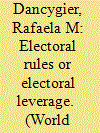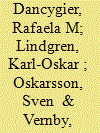| Srl | Item |
| 1 |
ID:
129989


|
|
|
|
|
| Publication |
2014.
|
| Summary/Abstract |
Immigration has fundamentally altered the ethnic and religious makeup of most advanced democracies, but substantial variation is observed in the political representation of immigrant-origin minority groups across countries and cities. Though existing research has highlighted the role of electoral institutions in explaining minority representation, it is often difficult to isolate their effects across contexts. Focusing on Muslims in England and employing a new data set containing over 42,000 candidate-level observations, this article explains Muslim candidate election and selection. To do this, the author makes use of a rule change whereby a subset of localities switched from the use of multimember elections to the use of single-member elections. She finds that these electoral rules have no significant effect on the share of Muslims that gets elected but that they do influence the selection process: in a given election, Muslims are half as likely to be selected when only one seat is up for election as compared with when three seats are in play. Yet parties balance the slate across consecutive single-member elections, leading to similar results across systems. Further, the more undesirable the seat, the more likely it is to have a Muslim on the ticket, but this effect holds only in single-member elections, and it reverses as Muslims gain electoral leverage. Overall electoral leverage proves crucial: the effect of institutions and the potential for institution-based discrimination are conditional on the size and concentration of the local Muslim population and the votes it can deliver at both the election and the selection stages.
|
|
|
|
|
|
|
|
|
|
|
|
|
|
|
|
| 2 |
ID:
143141


|
|
|
|
|
| Summary/Abstract |
Widespread and persistent political underrepresentation of immigrant-origin minorities poses deep challenges to democratic practice and norms. What accounts for this underrepresentation? Two types of competing explanations are prevalent in the literature: accounts that base minority underrepresentation on individual-level resources and accounts that emphasize political opportunity structures. However, due to the lack of data suitable for testing these explanations, existing research has not been able to adjudicate between these theories. Using registry-based microdata covering the entire Swedish adult population between 1991 and 2010 our study is the first to empirically evaluate these alternative explanations. We examine election outcomes to municipal councils over the course of six elections and find that variation in individual-level resources cannot explain immigrants’ underrepresentation. Further, when comparing immigrants and natives who face comparable political opportunity structures a large representation gap remains. Instead, we argue that discrimination by party gatekeepers plays a more significant role in perpetuating the underrepresentation of immigrants than do individual resources or structural variables.
|
|
|
|
|
|
|
|
|
|
|
|
|
|
|
|